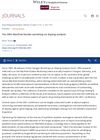 2 citations,
April 2023 in “BMC endocrine disorders”
2 citations,
April 2023 in “BMC endocrine disorders” The link between physical signs of high male hormones and hormone levels in women with PCOS changes with age.
2 citations,
August 2022 in “Middle East Fertility Society Journal” The new rodent model successfully mimics non-lean human PCOS symptoms.
 2 citations,
February 2022 in “Frontiers in Endocrinology”
2 citations,
February 2022 in “Frontiers in Endocrinology” Antiandrogenic pretreatment for women with PCOS does not improve fertility outcomes and delays pregnancy.
 1 citations,
December 2022 in “Life”
1 citations,
December 2022 in “Life” Topical corticosteroids are the main treatment for Erosive Pustular Dermatosis, but recurrence is common after stopping treatment.
1 citations,
November 2022 in “International journal of molecular sciences” Human fetal placental stromal cell injections speed up healing and improve skin and hair recovery after radiation damage.
 1 citations,
September 2023 in “Stem cell research & therapy”
1 citations,
September 2023 in “Stem cell research & therapy” Mesenchymal stem cells could help treat aging-related diseases better than current methods.
 1 citations,
August 2023 in “Advanced Drug Delivery Reviews”
1 citations,
August 2023 in “Advanced Drug Delivery Reviews” Microneedles are promising for long-acting drug delivery and can improve patient compliance, but more data is needed to confirm their effectiveness.
 1 citations,
May 2023 in “Frontiers in Endocrinology”
1 citations,
May 2023 in “Frontiers in Endocrinology” Autism's genetics are linked with early age of puberty and less hair loss, but not with hormone levels or polycystic ovary syndrome.
 1 citations,
May 2023 in “European Journal of Human Genetics”
1 citations,
May 2023 in “European Journal of Human Genetics” Rare ULBP3 gene changes may raise the risk of Alopecia areata, a certain FAS gene deletion could cause a dysfunctional protein in an immune disorder, and having one copy of a specific genetic deletion is okay, but two copies cause sickle cell disease.
1 citations,
January 2023 in “Journal of Obstetrics and Gynaecology” High DHEA and short cervical length in women with PCOS and recurrent miscarriages may harm pregnancy outcomes.
 1 citations,
October 2022 in “Journal of food and nutrition research”
1 citations,
October 2022 in “Journal of food and nutrition research” Cinnamon may help manage obesity and improve conditions related to Polycystic Ovary Syndrome (PCOS).
 1 citations,
January 2022 in “IntechOpen eBooks”
1 citations,
January 2022 in “IntechOpen eBooks” Different PCOS types respond uniquely to infertility treatments, with some having lower pregnancy rates and higher risks of complications.
 1 citations,
November 2021 in “Drug Testing and Analysis”
1 citations,
November 2021 in “Drug Testing and Analysis” The 39th Manfred Donike Workshop discussed methods for detecting misuse of steroids, gene doping, and the complexity of identifying drug residues in urine, highlighting the ongoing efforts to improve global anti-doping work.
 June 2023 in “Plastic and Reconstructive Surgery – Global Open”
June 2023 in “Plastic and Reconstructive Surgery – Global Open” Exosomes may improve skin, scars, hair growth, and fat grafts in plastic surgery, but more research is needed.
 November 2024 in “Applied Sciences”
November 2024 in “Applied Sciences” Placenta products might help with hair loss, but more research is needed.
 September 2024 in “Medicina”
September 2024 in “Medicina” Certain gene variations may protect against skin issues and oxidative stress in women with PCOS.
February 2024 in “Biomedicines” Pregnant women with PCOS have higher levels of Neurokinin B in the placenta, especially with female babies.
 February 2024 in “IntechOpen eBooks”
February 2024 in “IntechOpen eBooks” Myo-inositol-based treatments greatly improve pregnancy chances for women with PCOS.
 November 2023 in “JCEM Case Reports”
November 2023 in “JCEM Case Reports” A postmenopausal woman's excess male hormone symptoms improved after her ovaries were removed.
 November 2023 in “Gastroenterology”
November 2023 in “Gastroenterology” A woman with Budd-Chiari syndrome improved after treatment and needs a liver transplant, highlighting the importance of considering non-criteria antiphospholipid syndrome in similar cases.
 October 2023 in “IntechOpen eBooks”
October 2023 in “IntechOpen eBooks” Genes and epigenetic changes are important in the development of Polycystic Ovary Syndrome.
September 2023 in “Animals” Hair follicle development in cashmere goats involves dynamic changes in proteins and metabolites, with key roles for oxytocin, MAPK, and Ca2+ pathways.
 August 2023 in “Medicina-lithuania”
August 2023 in “Medicina-lithuania” Abusing steroids can damage your heart, muscles, reproductive system, liver, skin, and brain, and may increase the risk of Alzheimer's disease.
June 2023 in “Journal of personalized medicine” Androgen treatment with dihydrotestosterone may help maintain height in patients with 5-α-reductase type 2 deficiency, especially before puberty.
 April 2023 in “Clinical Chemistry and Laboratory Medicine”
April 2023 in “Clinical Chemistry and Laboratory Medicine” The document concludes that inflammation markers can be used in diabetes, vitamin D3 affects immune pathways, hyperthyroidism changes hormone levels, androgen levels help diagnose Adrenocortical Carcinoma, erectile dysfunction is linked to diabetes, hypogonadism is common in HIV-infected males, and hormones can be biomarkers for various conditions.
 February 2023 in “Vaccines”
February 2023 in “Vaccines” COVID-19 may harm male reproductive health and lower testosterone levels, potentially affecting fertility and causing erectile dysfunction. More research is needed.
 December 2022 in “Journal of Medical Case Reports”
December 2022 in “Journal of Medical Case Reports” A 20-year-old woman was found to have a rare ovarian tumor causing symptoms like acne and a low-pitched voice, which disappeared after the tumor was removed.
 August 2022 in “IntechOpen eBooks”
August 2022 in “IntechOpen eBooks” Congenital Adrenal Hyperplasia is a rare inherited disease causing hormone imbalances, affecting growth, fertility, and heart health, diagnosed through blood tests and treated with medication and lifestyle changes.
 January 2022 in “IntechOpen eBooks”
January 2022 in “IntechOpen eBooks” Some lesser-known causes of PCOS include autoimmune issues, genetic mutations, and changes in the body's microbiome.
 January 2021 in “Case Reports”
January 2021 in “Case Reports” A 71-year-old woman developed male-like features due to high testosterone levels caused by a benign ovarian tumor, which was successfully removed by surgery.
























